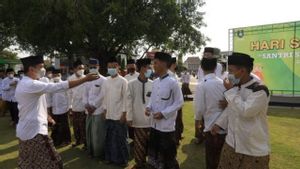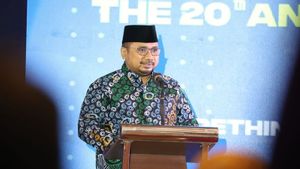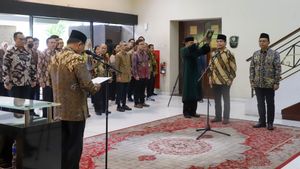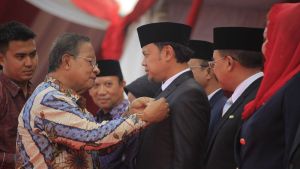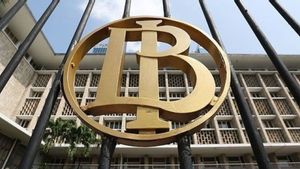
JAKARTA - Solo Mayor, Gibran Rakabuming, suddenly whispered to the Minister of Religion, Yaqut Cholil Qoumas, who was sitting next to him. A moment later, Gibran left the Minister of Religion Yaqut when he attended the 20th Annual International Conference on Islamic Studies (AICIS) in Solo.
Gibran and the Minister of Religion, who is familiarly called Gus Yaqut, are currently participating in the opening of AICIS in Solo. In this event, the two of them also previously listened to the opening of Vice President Maruf Amin which was delivered virtually.
But after the vice president finished speaking, Gibran's aide came to his boss who was sitting next to Gus Yaqut. His aide then whispered something to Gibran. A moment later, Gibran immediately asked the Minister of Religion for permission to go first.
"Sorry, there is a plenary session", said Gibran, trying to explain to other Ministry of Religion officials, Monday, October 25.
Gibran and the adjutant then ran across the parking lot. Gibran's aide was busy looking for an official car to be able to immediately slide to meet the plenary invitation meeting from the Solo City Regional House of Representatives.
SEE ALSO:
Previously, Maruf said that the COVID-19 pandemic and all of its impacts were a new experience for almost all governments in the world, so the Indonesian government had to take extraordinary decisions and actions to deal with it. The world needs new ideas to overcome the challenges of the COVID-19 pandemic, both from the medical and non-medical aspects covering all fields affected by this outbreak. This is where the role of Islamic jurisprudence is believed to be able to provide contextual solutions so that the best policies can be taken.
"I believe Islamic jurisprudence can provide solutions and contribute ideas to overcome the COVID-19 pandemic and all its impacts", said Vice President Maruf.
This belief, continued the Vice President, is because Islamic jurisprudence is intended to provide benefits for everyone.
"Islamic Jurisprudence is not intended to complicate life, but on the contrary Islamic Jurisprudence is a solution for human life, including a solution to deal with the COVID-19 pandemic", he said.
Furthermore, the Vice President gave an example that the COVID-19 pandemic had an impact on religious life.
"The ulema in almost all countries, especially those with Muslim populations, have reviewed their religious views. The ulema conduct ijtihad to determine a new fatwa that is more relevant to the pandemic conditions", he said.
The Vice President revealed that the new fatwa is a guide for Muslims in their respective countries, for example on how to carry out worship in the midst of the COVID-19 pandemic, both for medical personnel, sufferers, or Muslims in general, regarding the procedures for curing the corpses of positive COVID-19 patients which is by health protocols, and fatwas related to economic instruments that can be used to mitigate the impact of the COVID-19 pandemic.
"Basically, the teachings of Islam were revealed by Allah SWT not to make it difficult for its adherents. In carrying out worship some things can be done in a normal way, namely when done in normal situations. However, in abnormal conditions, worship can be carried out by adjusting the existing conditions", he said.
As for the abnormal condition, according to the Vice President, it could be in the form of difficulty or sharia emergency, both of which are the reasons for the relief (rukhsah) in carrying out Islamic teachings.
"Islamic law has flexibility in its implementation according to existing conditions", he said.
In every discussion of fiqh, said the vice president, whether it concerns worship, muamalah, jinayah, and others, always contains guidelines and provides guidance regarding the benefit and realization of the main goal of the derivation of sharia.
"This flexibility of Islamic jurisprudence has become the spirit of the fatwas of scholars at all times, including during this COVID-19 pandemic", he said.
Furthermore, the Vice President explained that the current state of the COVID-19 pandemic has made life safety the most important consideration in setting a fatwa because there is no alternative to replace it.
"Thus the handling of COVID-19 is not merely a health problem, but is an important part of religious issues that are by sharia, which in nature provides care and protection", he stressed.
Appearing to be present at the offline and online event were Mayor of Surakarta Gibran Rakabuming Raka, Chancellor of UIN Raden Mas Said Surakarta Mudhofir, Director General of Islamic Research Institute of International Islamic University of Pakistan Mohammad Khalid Mas'ud, Professor of Islamic Law at UIN Mataram Mohammad Abdun Nasir, officials from the Ministry of Religion, Ambassadors of Friendly Countries, as well as UIN/IAIN Chancellors and STAIN Chairs throughout Indonesia.
The English, Chinese, Japanese, Arabic, and French versions are automatically generated by the AI. So there may still be inaccuracies in translating, please always see Indonesian as our main language. (system supported by DigitalSiber.id)


